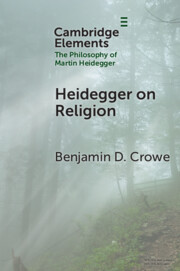Heidegger on Presence
Heidegger calls the thought that 'being is presence' the 'thunderbolt' that led him to link being and time and inspired his deconstruction of Western metaphysics. However, the scope of the concept of presence varies in his texts; the narrower it is, the more dramatic yet less plausible is his 'thunderbolt.' What is presence? Does Heidegger ultimately reject presence as the meaning of being, or does he accept it if conceived broadly enough? This study surveys the meaning and status of 'presence' in Heidegger. The author argues that he maintains a critical perspective, and that his critique can be applied not only to the tradition as interpreted in his 'history of being,' but also to contemporary phenomena such as information technology.
Product details
March 2025Hardback
9781009550932
76 pages
229 × 152 × 6 mm
0.249kg
Available
Table of Contents
- A Note on Citations
- 1. How Does it Stand with Presence?
- 2. The Meaning of 'Being'
- 3. The Meaning of 'Presence'
- 4. Heidegger's Developing Thought on Presence
- 5. Presence in the History of Being
- 6. Presence and Engagement
- References.






